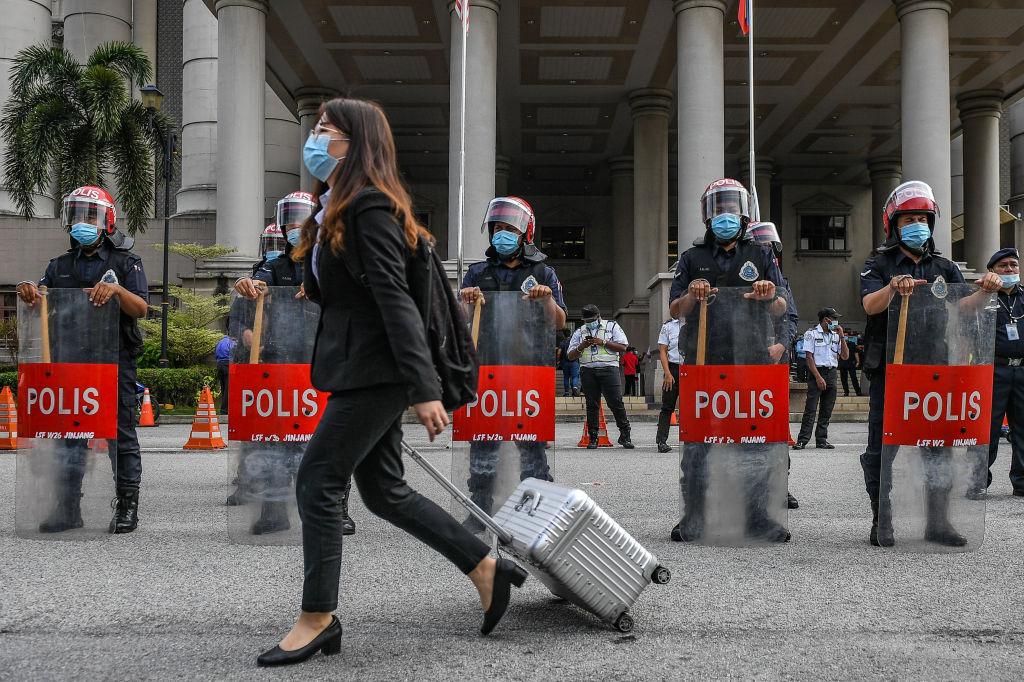Malaysia’s new parties and old cronyism
Posted By Huong Le Thu and Alexandra Pascoe on September 4, 2020 @ 11:08
After the historic election in 2018 ended the six-decade-long rule of coalitions led by the United Malays National Organisation (UMNO) and the return of 92-year-old Mahathir Mohammad as prime minister, many hoped for a new dawn [1] for Malaysia. The unexpected victory of the unlikely alliance between former archrivals Mahathir and Anwar Ibrahim was hailed as a return to sanity after the breathtaking corruption of Najib Razak’s prime ministership.
Three years later, little progress has been made with long-anticipated reforms, and Malaysian politics seems even more entrenched in scandals, instability and intrigues. Longstanding political feuds, and the recent changes in the prime ministership and ruling coalition, make Australia’s period of leadership instability seem almost boring.
In just a couple of months, Mahathir resigned—but then said he didn’t mean to—and a new PM, Muhyiddin Yassin, took office after some other head-spinning developments. Mahathir appealed to the king, saying he had the parliamentary majority, and accused his own coalition, Pakatan Harapan, of betrayal.
Why and where did things go wrong?
The Mahathir–Anwar rivalry quickly resurfaced after the 2018 election. Mahathir had been evasive about his 2018 promise to transfer the leadership position to Anwar, refusing to confirm when or if it would eventually take place.
These tensions came to a head in February this year when Anwar accused [2] Mahathir of attempting to form a new government with Bersatu and UMNO in order to exclude Anwar from the leadership. Mahathir went on to unexpectedly resign from office. That led, in a nutshell, to a collapse in the ruling coalition when Muhyiddin and some of Bersatu partnered with several other parties, including UMNO, to assume power [3] under a new ruling coalition, Perikatan Nasional (PN).
So here we are again: UMNO is back in the game and Malaysians once again find themselves disenchanted with their elected government’s lack of progress. The rising cost of living [4], stagnating wage growth, a lack of affordable housing and persistent corruption [5] remain key concerns.
However, corruption in Malaysia was dealt a symbolic blow in the trial of one of the biggest scandals of our time—the 1Malaysia Development Berhad (1MDB) scandal. Former PM Najib Razak wound up being sentenced to 12 years in prison on seven charges [6] of abuse of power, breach of trust and money laundering. The verdict was received with jubilation by Najib’s critics, who described [7] it as ‘a huge victory for Malaysians’.
The ruling against Najib delivers Muhyiddin some degree of credibility as a leader who’s taking corruption seriously. Still, it raises questions about his already very narrow parliamentary majority.
Prime Minister Muhyiddin was able to secure a crucial victory [8] in the parliament [8] in July, replacing the speaker with his party’s preferred candidate and confirming his slim parliamentary majority [9].
However, following defections from Muyhiddin’s party to Mahathir’s new party, Bersatu, the new PM had to join the Muafakat Nasional alliance composed of UMNO and another Muslim-Malay party, Parti Islam SeMalaysia. This will give UMNO, the biggest party in the parliament, the upper hand at the next election.
The 2018 election victory has now left many disillusioned, as the transfer of power alone has proved insufficient to address Malaysia’s endemic corruption and cronyism. Despite the emergence of new parties, the political class has remained the same and simply engaged in a game of musical chairs [10]. In the end, it was nothing more than a reshuffling of the old guard. In fact, the end of UMNO’s rule has introduced even more political manoeuvring, instability and unpredictability.
It’s unsurprising, then, that the entrenched networks of patronage and corruption have limited the government’s ability to advance its reform agenda on ending that same corruption. The chances of the government’s delivering on economic growth and the structural issues surrounding Malaysia’s ‘Malay first [11]’ (bumiputra) policies seem similarly remote.
Most recently, Mahathir has formed a new party, Parti Pejuang Tanah Air [12], or ‘Fighters of the Nation Party’, which will contest the next election—whenever that may be. The party is unaligned with any existing coalition. Mahathir has said [12] it will be Malay-based and will be focused on fighting corruption and ensuring Malaysia ‘once against become[s] an Asian tiger’.
But with the mounting challenges to the global economy posed by Covid-19 and threats to regional security resulting from China’s raising of tensions in the South China Sea, Malaysia’s domestic preoccupations will limit its ability to respond to external challenges.
Even though Malaysia recently issued a rejection of China’s claim to ‘historic rights’ in the South China Sea, in a rare and important note verbale [13] to the UN, that move highlights the consistency of Malaysia’s South China Sea policy rather than marking a change. With internal politics occupying the current government, foreign policy is unlikely to receive much sustained attention.
Infighting among the political elite puts Malaysia’s future at stake, especially in a time of crisis like this one. If politicking persists, Malaysia risks falling further from its previous position as one of Southeast Asia’s economic success stories and giving itself a less than optimal chance for recovery from the Covid-induced global crisis.
Article printed from The Strategist: https://aspistrategist.ru
URL to article: /malaysias-new-parties-and-old-cronyism/
URLs in this post:
[1] new dawn: https://www.freemalaysiatoday.com/category/opinion/2018/05/10/a-new-dawn-a-nation-reborn/
[2] accused: https://www.aljazeera.com/news/2020/02/malaysian-politics-turmoil-mahathir-anwar-alliance-200224025017186.html
[3] assume power: https://www.cnbc.com/2020/03/02/malaysia-political-crisis-muhyiddin-yassin-appointed-as-prime-minister.html
[4] cost of living: https://www.thestar.com.my/business/business-news/2019/12/30/rising-cost-of-living-draws-concern
[5] persistent corruption: https://www.aljazeera.com/indepth/opinion/cleaning-corruption-malaysia-najib-190522110246585.html
[6] seven charges: https://www.economist.com/asia/2020/07/30/najib-razak-is-found-guilty-on-seven-charges-in-the-1mdb-scandal
[7] described: https://www.reuters.com/article/us-malaysia-politics-najib-factbox/factbox-reactions-to-guilty-verdict-of-malaysias-ex-pm-najib-idUSKCN24T1HC
[8] secure a crucial victory: https://theaseanpost.com/article/malaysia-pm-wins-parliamentary-test-support
[9] parliamentary majority: https://asia.nikkei.com/Politics/Malaysia-in-transition/Malaysia-parliament-speaker-switch-lifts-Muhyiddin-s-survival-odds
[10] musical chairs: /political-tsunami-or-musical-chairs/
[11] Malay first: https://thediplomat.com/2020/03/malaysias-malay-first-malaise/
[12] Parti Pejuang Tanah Air: https://www.channelnewsasia.com/news/asia/former-malaysia-prime-minister-mahathir-mohamad-party-pejuang-13015038
[13] note verbale: https://www.straitstimes.com/asia/se-asia/malaysia-issues-rare-rebuke-against-china-over-south-china-sea
Click here to print.
